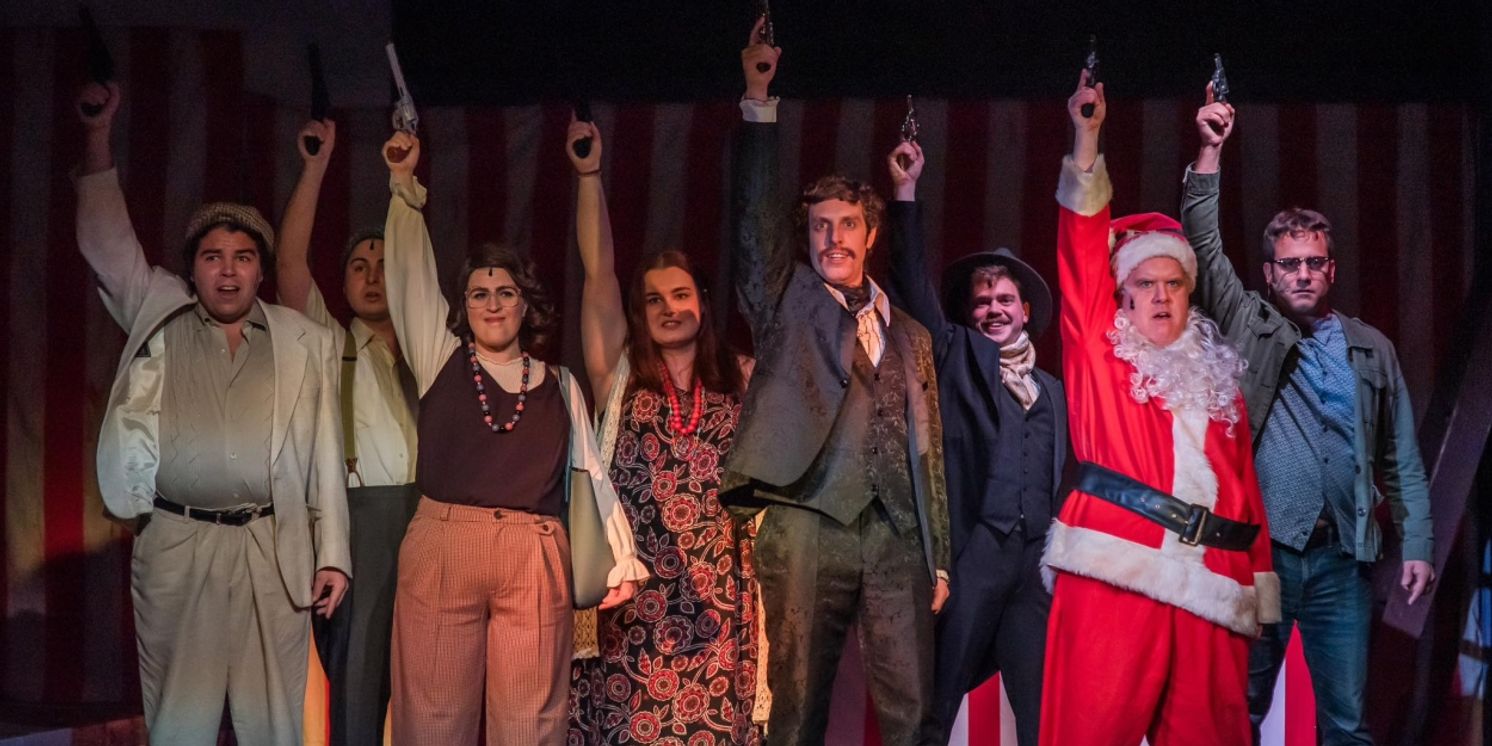Review: ASSASSINS Goes for the Prize at Riverfront Theater Company
Riverfront Theater Company closes its season with a Sondheim challenge.

It's never a good time, or a bad time, to produce Sondheim's Assassins, because the musical is easily Sondheim's most prickly, controversial and tonally jarring. Major productions around the world are always called both "too soon" and "prescient," because the show's themes of political violence, late stage capitalism, radicalization and the dangers of guns will always be front page news. Thankfully, director Jeff Johnston and music director/perucssionist Thomas Rigby have assembled a great team of local actors and a surprisingly full and solid band to deliver a funny but sobering take on this modern classic.
With book by John Weidman and music and lyrics by Sondheim, the show takes place out of linear time and space. In a nightmarish carnival and barroom, the people who have successfully or unsuccessfully attempted to kill the President relive their actions, torment each other, and cope with their remaining or dwindling fame, while attempting to keep "the dream" (both the American Dream and the dream of killing a president and becoming infamous) alive. They are egged on at one end by the sardonic Proprietor (Zack Spurlock) and condemned by the optimistic Balladeer (Carmen LoPresti).
The show is somewhat plotless until the ending, with sketchlike scenes interspersed with seriocomic musical sequences depicting each assassin's background. John Wilkes Booth, here played by Ian C. Olson, is the paterfamilias, a dignified and imposing presence that still gives you the ick. Olson manages to balance Booth's charm and his unsettling propensity for violence and hate. While this production opts to censor the infamous moment in which Booth's mask slips and he utters one of the harshest slurs in the American vernacular, we can still see the man behind the mask in Olson's mannered performance. Notably less mannered are the two "crazy" assassins, Charles Guiteau (Jake Froehlich) and Sam Byck (Tom Protulipac). Guiteau is high camp, a living cartoon character not unlike Daffy Duck at his most preeningly self-aggrandizing, and Froehlich has great fun playing this mercurial weirdo. ON the other hand, Tom Protulipac finds both the humor and the genuine fear and suffering in the delusional, connection-seeking Byck's rants. Forever writing a mixed manifesto, love letter and suicide note into his tape recorder, Protulipack veers between the humorous, the sad sack and the genuinely frightening as would-be hijacker Byck's mood lurches wildly. We close Act 1 on one of his monologues instead of on a song, and it's a sobering moment.
Joyce Hinnebusch and Anna Gergerich provide solid comic relief as the two "lady killers" and associates of Charles Manson, one intimate and one distant, who try to take out Gerald Ford. (Quick shout-out to Jim Froehlich, himself a stalwart of community and small professional theatres in the Pittsburgh area, for his cameo as Gerald Ford; he's sharing the stage with son Jake as Guiteau.) On the more serious side, Brandon Marzke has an eerie mix of self-possession and rage as the proto-incel John Hinkley, who tried to kill Reagan to impress Jodie Foster. Jeremy Galloza and Jordan Mastele carry great gravitas, taking a more grounded approach with the proto-anarchists Zangara and Czolgosz respectively. There's a fascinating contrast between these two characters: Czolgosz becomes politically activated towards Communism by Emma Goldman, and strikes as an idealist for worker's rights. Meanwhile, Zangara swears up and down that he's not a leftist or a right-winger, is thoroughly apolitical, but halfway through his own execution speech seems to realize that "only capitalists get photographers," and finally grows disenchanted with his own political fence-sitting.
Any fan of Assassins knows to wait for the incredibly tense final scene, and Johnston's cast pulls it off with aplomb. First, the Assassins march into the audience, dancing and marching and screaming as they sing. Their close proximity is incredibly distracting and unsettling, which allows the crew to do the show's only set change almost without anyone noticing. Then, LoPresti and Olson have their big showdown and "passing of the torch moment," and the mood of the entire piece changes on a dime. That's Assassins, and that's America.
Reader Reviews
Videos

